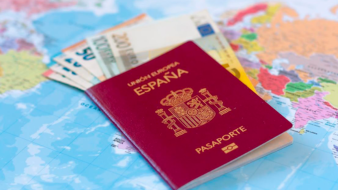Which Business Has the Best Chances of Getting an Entrepreneur Residency Permit in Spain?
The entrepreneur residency permit (La autorización de residencia y trabajo por cuenta propia) is one of the legal ways to reside in Spain on a long-term basis by starting a business in the country. This option is attractive for foreign entrepreneurs looking to relocate to Europe. A person granted this permit can live in Spain for an extended period and run their business. They are also allowed to bring their family — spouse and children. Importantly, there is no minimum required period of stay in the country.
 A crucial requirement for obtaining this permit is a detailed and realistic business project. It should clearly outline your goals, business development strategy, financial projections, and marketing plan. However, a business plan alone is not enough. You must also prove your financial solvency, which can be demonstrated through bank statements, investments, or other financial documents.
Documents required for applying for the entrepreneur residency permit in Spain:
A crucial requirement for obtaining this permit is a detailed and realistic business project. It should clearly outline your goals, business development strategy, financial projections, and marketing plan. However, a business plan alone is not enough. You must also prove your financial solvency, which can be demonstrated through bank statements, investments, or other financial documents.
Documents required for applying for the entrepreneur residency permit in Spain:
 Some business sectors are more attractive to Spain. When deciding what kind of business to start, consider its relevance to the local economy. For instance, Spain aims to become a leader in technology and innovation. Startups in IT, biotechnology, or artificial intelligence have a high likelihood of being approved.
Tourism is another major economic sector in Spain. Opening a hotel, travel agency, or tour company can offer excellent opportunities. The food service industry — cafés and restaurants — is also popular. However, this field is highly competitive, so significant investment and a well-detailed business plan highlighting your unique selling proposition (USP) are crucial.
For those wanting something less conventional, consider green technologies. There’s growing interest in sustainable development. A business focused on renewable energy or waste recycling could be promising.
Other promising sectors include:
Some business sectors are more attractive to Spain. When deciding what kind of business to start, consider its relevance to the local economy. For instance, Spain aims to become a leader in technology and innovation. Startups in IT, biotechnology, or artificial intelligence have a high likelihood of being approved.
Tourism is another major economic sector in Spain. Opening a hotel, travel agency, or tour company can offer excellent opportunities. The food service industry — cafés and restaurants — is also popular. However, this field is highly competitive, so significant investment and a well-detailed business plan highlighting your unique selling proposition (USP) are crucial.
For those wanting something less conventional, consider green technologies. There’s growing interest in sustainable development. A business focused on renewable energy or waste recycling could be promising.
Other promising sectors include:
 Applicants must meet certain conditions. You must be an adult, have no criminal record, and reside in Spain legally. The first step is to develop your business plan, including a summary of your professional background — a strong business reputation can increase your chances.
Describe the planned activities of your company, assess market demand and competition, and include a financial plan showing funding sources. You’ll also need to indicate how many jobs your business will create.
Once your business plan is ready, start gathering documents:
Applicants must meet certain conditions. You must be an adult, have no criminal record, and reside in Spain legally. The first step is to develop your business plan, including a summary of your professional background — a strong business reputation can increase your chances.
Describe the planned activities of your company, assess market demand and competition, and include a financial plan showing funding sources. You’ll also need to indicate how many jobs your business will create.
Once your business plan is ready, start gathering documents:
Go back to the blog
Conditions for Obtaining the Entrepreneur Residency Permit
 A crucial requirement for obtaining this permit is a detailed and realistic business project. It should clearly outline your goals, business development strategy, financial projections, and marketing plan. However, a business plan alone is not enough. You must also prove your financial solvency, which can be demonstrated through bank statements, investments, or other financial documents.
Documents required for applying for the entrepreneur residency permit in Spain:
A crucial requirement for obtaining this permit is a detailed and realistic business project. It should clearly outline your goals, business development strategy, financial projections, and marketing plan. However, a business plan alone is not enough. You must also prove your financial solvency, which can be demonstrated through bank statements, investments, or other financial documents.
Documents required for applying for the entrepreneur residency permit in Spain:
- A valid passport
- Current Spanish residency card (if switching from another residency type)
- A comprehensive and realistic business plan tailored for Spain
- Documents confirming financial solvency, including bank statements
- A police clearance certificate from your country of residence
The Importance of Choosing the Right Business
Choosing the right business significantly impacts your chances of obtaining the entrepreneur residency permit. The Spanish authorities will carefully assess your business plan. If it aligns with Spain’s interests, your application has a higher chance of being approved. Successful cases show that a strong business idea is key to relocating long-term. Take Elena’s example: she opened a breakfast-only café in Spain. Her business allowed her and her family to stay in the country long-term. On the flip side, Denis invested heavily in a cleaning company, but due to intense competition and high staff turnover, he had to return to Russia and start over.Business Sectors with the Highest Chances of Approval
 Some business sectors are more attractive to Spain. When deciding what kind of business to start, consider its relevance to the local economy. For instance, Spain aims to become a leader in technology and innovation. Startups in IT, biotechnology, or artificial intelligence have a high likelihood of being approved.
Tourism is another major economic sector in Spain. Opening a hotel, travel agency, or tour company can offer excellent opportunities. The food service industry — cafés and restaurants — is also popular. However, this field is highly competitive, so significant investment and a well-detailed business plan highlighting your unique selling proposition (USP) are crucial.
For those wanting something less conventional, consider green technologies. There’s growing interest in sustainable development. A business focused on renewable energy or waste recycling could be promising.
Other promising sectors include:
Some business sectors are more attractive to Spain. When deciding what kind of business to start, consider its relevance to the local economy. For instance, Spain aims to become a leader in technology and innovation. Startups in IT, biotechnology, or artificial intelligence have a high likelihood of being approved.
Tourism is another major economic sector in Spain. Opening a hotel, travel agency, or tour company can offer excellent opportunities. The food service industry — cafés and restaurants — is also popular. However, this field is highly competitive, so significant investment and a well-detailed business plan highlighting your unique selling proposition (USP) are crucial.
For those wanting something less conventional, consider green technologies. There’s growing interest in sustainable development. A business focused on renewable energy or waste recycling could be promising.
Other promising sectors include:
- Education and Training: Launching a language school, educational center, or online course platform contributes to quality education in the country.
- Healthcare Services: Private clinics, dental practices, and rehabilitation centers can also be successful ventures.
Key Criteria for a Successful Business Plan
When preparing your project, pay attention to the following evaluation criteria for business plans in Spain:- Innovation and Uniqueness: Spain welcomes new ideas and technologies. The business should offer something creative and cutting-edge — such as IT startups, green tech, or creative industries.
- Financial Sustainability: Your plan must demonstrate potential profitability, with clear financial forecasts, investment strategies, and revenue/cost calculations.
- Job Creation: Projects that generate employment are highly valued. Include the number of jobs you expect to create and explain their impact on the local economy.
- Social Impact: Add information on potential social initiatives, support for nonprofits, or environmental sustainability efforts.
Application Process for the Entrepreneur Residency Permit
 Applicants must meet certain conditions. You must be an adult, have no criminal record, and reside in Spain legally. The first step is to develop your business plan, including a summary of your professional background — a strong business reputation can increase your chances.
Describe the planned activities of your company, assess market demand and competition, and include a financial plan showing funding sources. You’ll also need to indicate how many jobs your business will create.
Once your business plan is ready, start gathering documents:
Applicants must meet certain conditions. You must be an adult, have no criminal record, and reside in Spain legally. The first step is to develop your business plan, including a summary of your professional background — a strong business reputation can increase your chances.
Describe the planned activities of your company, assess market demand and competition, and include a financial plan showing funding sources. You’ll also need to indicate how many jobs your business will create.
Once your business plan is ready, start gathering documents:
- Valid passport
- Visa application form (for first-time applicants) or residency permit form (for switchers)
- Health insurance policy (public or private)
- Legalized police clearance certificate with certified translation
- Bank statement proving sufficient funds: at least €2,130/month for the main applicant and €532/month for each dependent
- Marriage and birth certificates (if applying for family members)
- Proof of payment for the visa or permit application fee
- Passport-sized photo (3.5 x 4.5 cm)


 11/05/2025
11/05/2025  Reading time: 5 min
Reading time: 5 min 



